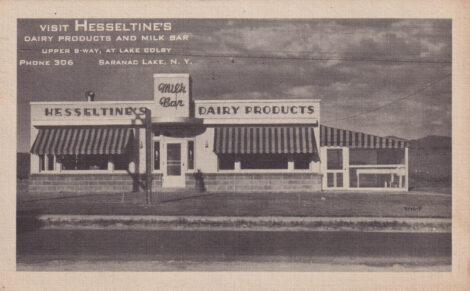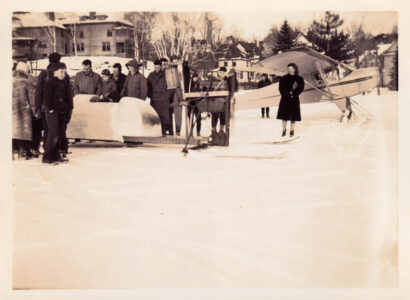Signs (and NO signs) of the times
Last weekend was The Paul Smith’s College reunion and it was a special one for the Class of ’75, since it was their 50th. It was also special for me, because having started teaching there in ’73, that class was my first one. Beyond that, two of my rave-faves from the class, Jack Skelley and Time Vail, would be there.
I’ve been in touch with Jack and Tim enough over the past half-century that I don’t think of them as former students, but as dear friends. They’re also excellent storytellers, which is de rigeur, since the essence of reunions is swapping tales about The Glory Days. And in our case the GD’s were The Buxton Era.
Chester L. Buxton ran Paul Smith’s College from 1948-1976, and he ran it often single-minded and always single-handed. He did all the hiring and firing — from cafeteria workers and maintenance people, to faculty and administrators (of whom, when he was there, were blessedly few). An advisor to him was as important as the towel man at an orgy. He was a man of few words and a perfect gentleman, always impeccably dressed. The only times I ever saw him not wearing a suit was during hot summer days when he really let his hair down and wore a blazer and slacks (and it should go without saying, he ALWAYS wore a tie).
Following military tradition, the faculty referred to him as “The Old Man,” with equal measures of affection and respect, but NEVER to his face. One of the older faculty told me there was a teacher in the ’50s and ’60s who called Dr. B. by his first name, but I never managed to confirm it.
I always thought of Dr. B. as a combination of Santa Claus and the Old Testament God. To liberally paraphrase a quote from the Book of Job: Buxton gaveth, and Buxton tooketh away. He was generous to a fault, but when occasion demanded (or he thought it did), he could lay a transgressor to waste. And the focal story of Reunion 2025 was Jack Skelley’s Great Transgression.
After Jack graduated, he worked in the PSC Lands Department. And work he did, because the department were involved in a Herculean chore. Paul Smith’s owned about 65,000 acres (no typos there, lest you wonder), but their deeds had been destroyed in the Paul Smiths hotel fire of 1930. Mind you, all this land was not contiguous, thus Fred Klein, the head of the Lands Department had to painstakingly go through all the deeds in the county office, snagging the Paul Smith’s ones buried hither, thither and yon from among the others.
Fred was the man for the job. A WWII fighter pilot, he was a high-energy guy, smart as a whip, and scrupulous with detail. He was also a helluva nice guy — always upbeat and pleasant, with sparkling dark brown eyes, and a crooked smile plastered on his mug. You couldn’t have found a mean bone in his body with a shipload of MRI’s, and if there was anyone who didn’t like him, I never met them.
But finding those deeds was only part of the job, because once in hand, the plots had to be resurveyed, and maps of their borders had to be drawn up. And that’s where Our Boy Skelley comes in: He was one of the 10 or so guys in the office who went out in the field and did the surveying. And, indirectly, that field work that led to his Great Transgression.
–
Paying (your dues) for a free lunch
–
Back then, all PSC employees could have free lunches in the cafeterias (and free breakfasts and dinners as well, if they wanted). Because the Lands crew were in the field all day, they took their lunches with them. But since Fred didn’t want the cafeteria staff to do any extra work, every day two guys from the department would make the lunches and shlep them along. Fred being Fred, he had a rotation so everyone got the duty the same number of days per cycle.
One fine July day, Jack and another guy had lunch duty and went into the cafeteria cooler, checked out what was available, and made up however many sandwiches they needed. They also always got a piece of fruit for each lunch, a pint of milk, and if they lucked out, they swiped some bags of potato chips.
The lunches made, Jack loaded up the crates with the chow, put it in the trunk of his car, and drove over to where the rest of the crew waited, across from the cafeteria.
Jack had parked the car and just gotten out when another car pulled up near his. It was the black Buick known to everyone at PSC — Dr. B’s “staff car.” The car turned off and Dr. B. got out. He stared at Jack through narrowed eyes, and then motioned for Jack to join him.
Jack trudged over, all the while invoking the name of St. Jude — the patron saint of lost causes. He didn’t know what he’d done, but he MUST’VE done something or The Old Man wouldn’t have wanted to see him.
As soon as Jack was in front of him, Dr. B. started, going up one side of him and down the other, chewing him out in a way that would’ve made any drill instructor proud.
And what had Jack done?
He’d parked in a no parking zone.
Jack didn’t know it was a no parking zone for one simple reason: There wasn’t a No Parking sign in sight.
But if there were no signs, why was it a no parking zone? Simple: Because Dr. B. said it was. Ipso facto.
A less astute student of human nature (or in this case, Buxton nature) would’ve told the good doctor about the lack of any appropriate signage. But Jack, though young and naive, was a quick study — he’d learned early on in his PSC career how things worked, or more specifically, how The Old Man worked: If Jack pointed out the lack of no parking signs, he’d also be pointing out that Dr. B. was making a mistake. As it was, he was already getting his psyche scourged; the last thing he wanted to do was destroy it.
Dr. B. pointed out that disrespect for the law like Jack’s not only caused the collapse of all the great civilizations, but was the stuff, of cowards, fools and traitors. People like Jack had caused The Stock Market Crash of ’29, the Russian Revolution and the Boston Molasses Flood. Then in mid-diatribe, Dr. B. glanced at his watch and a look of shock crossed his face: He had an appointment in mere minutes and if he didn’t cut short the ego demolition, he’d be late. The Old Man prided himself on his punctuality and found tardiness in others inexcusable. Tardiness in himself was unknown.
What to do?
Dr. B. may have run the school like he was Lord of the Manor, but in matters of life, death and chewings-out, he could delegate. He left Jack, went over to Fred, and told him to finish what he’d started.
Fred, who’d graduated from PSC in the 40’s and had worked there almost ever since, knew where his bread was buttered, so he immediately agreed. After he did, Dr. B. went back to his car.
Now here’s the scene: Jack and Fred are facing each other, with Fred’s back turned to Dr. B. Standing ramrod straight, Fred was shaking his finger at Jack and apparently giving him holy hell. In reality, the only thing he said was for Jack not to look in Dr. B’s direction, but to let him know when The Old Man drove away. Jack, playing his part to perfection, a faux look of terror on his face, kept nodding, nonstop, subserviently, almost idiotically.
Finally, breathing a huge sigh of relief, Jack, “He’s gone.”
“Good,” said Fred breathing a huge own sigh of relief.
For a long moment, neither spoke.
Then, his face split by his trademark grin, Fred said, “All right, Skelley, consider yourself chewed.”



